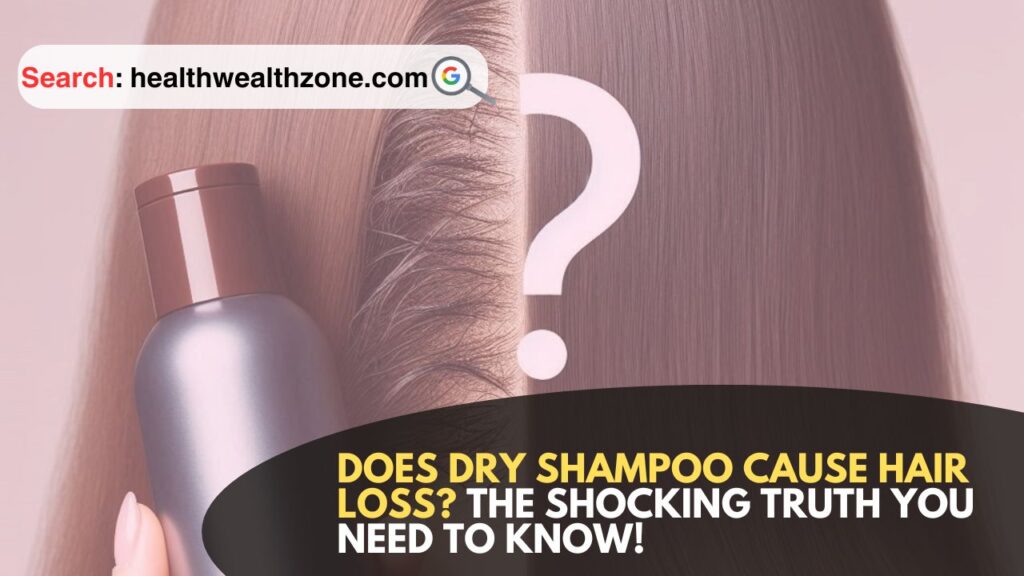Does Dry Shampoo Cause Hair Loss?: Dry shampoo has become a lifesaver for people leading busy lives, offering a quick fix to greasy hair without the need for a full wash. It’s a convenient solution for extending the time between washes, adding volume, and maintaining a fresh look. However, recent concerns have emerged about whether dry shampoo can contribute to hair loss. In this article, we’ll explore the truth behind these claims, backed by science, expert opinions, and actionable tips.

👉 Don’t Wait — Order HairFortin from the Official Site Today
What Is Dry Shampoo?
Dry shampoo is a hair care product designed to absorb excess oil, dirt, and grease from the scalp and hair without the need for water. It’s typically available as a spray, powder, or foam. Most dry shampoos contain ingredients like starches, alcohols, or clays that soak up oil, leaving the hair looking cleaner and more voluminous.
Common Ingredients in Dry Shampoo:
- Alcohols: Help dissolve oils and evaporate quickly.
- Starches (e.g., rice or corn starch): Absorb sebum and grease.
- Clays: Add texture and absorb excess oil.
- Fragrances: Provide a fresh scent.
👉 Don’t Wait — Order HairFortin from the Official Site Today
The Alleged Link Between Dry Shampoo and Hair Loss
Hair loss can be alarming, and concerns about whether dry shampoo might play a role have gained traction. Here’s a breakdown of the claims and the science behind them:
1. Clogging Hair Follicles
Using dry shampoo excessively can lead to the buildup of product, oil, and dead skin cells on the scalp. This buildup may clog hair follicles, potentially leading to conditions like folliculitis (inflammation of the hair follicles), which could contribute to hair shedding over time.
2. Scalp Irritation
Some people experience scalp irritation or allergic reactions to ingredients in dry shampoo, such as fragrances or alcohols. An irritated scalp can disrupt the hair growth cycle and lead to temporary hair loss.
3. Weakening Hair Strands
Dry shampoo doesn’t provide the cleansing benefits of regular washing, and excessive use can cause hair to become dry and brittle. This brittleness can make hair more prone to breakage.


4. Hygiene Issues
Relying too heavily on dry shampoo without regular washing can compromise scalp health. A dirty scalp may foster fungal or bacterial growth, which can impact hair health and growth.
What Experts Say
Dermatologists and trichologists (hair and scalp specialists) emphasize that occasional use of dry shampoo is unlikely to cause hair loss. However, overuse or improper use may contribute to scalp and hair issues over time.
Key Takeaways from Experts:
- Moderation Is Key: Using dry shampoo 1-2 times a week is generally safe.
- Proper Scalp Hygiene: Regular washing is crucial to maintain a healthy scalp.
- Ingredient Sensitivity: Be mindful of any reactions to specific ingredients.
How to Use Dry Shampoo Safely
To minimize potential risks and enjoy the benefits of dry shampoo, follow these best practices:
- Don’t Overuse: Limit dry shampoo usage to 1-2 times per week.
- Apply Correctly: Hold the product 6-8 inches away from your scalp and focus on the roots.
- Massage Thoroughly: Use your fingers to distribute the product evenly.
- Wash Regularly: Shampoo and condition your hair properly to remove buildup.
- Choose the Right Product: Opt for dry shampoos with gentle, natural ingredients.
Table: Comparing Dry Shampoo with Regular Shampoo
| Feature | Dry Shampoo | Regular Shampoo |
| Purpose | Absorbs oil and refreshes hair | Cleanses hair and scalp |
| Usage | No water required; quick fix | Requires water and rinsing |
| Frequency | Occasionally (1-2 times per week) | Regularly (2-3 times per week or as needed) |
| Ingredients | Starches, alcohols, clays, fragrances | Surfactants, conditioners, essential oils |
| Impact on Scalp | Can lead to buildup if overused | Maintains scalp hygiene |
FAQs About Dry Shampoo and Hair Loss
1. Can dry shampoo replace regular washing?
No. Dry shampoo is a temporary solution and should not replace regular washing with water and shampoo.
2. Does dry shampoo work for all hair types?
Yes, but some formulations may be better suited for specific hair types (e.g., fine hair vs. curly hair). Check the label for recommendations.
3. How often is it safe to use dry shampoo?
Experts recommend using dry shampoo no more than 1-2 times per week to prevent buildup.
4. What are the signs of overusing dry shampoo?
Signs include an itchy scalp, dandruff, hair breakage, and a greasy feeling despite application.
5. Can dry shampoo cause permanent hair loss?
There is no evidence to suggest that dry shampoo directly causes permanent hair loss. However, improper use may contribute to temporary shedding.
Tips for Maintaining Healthy Hair
- Stick to a Washing Routine: Wash your hair 2-3 times a week with a gentle shampoo.
- Stay Hydrated: Drink plenty of water to support overall hair health.
- Use a Balanced Diet: Include foods rich in vitamins, minerals, and proteins.
- Limit Heat Styling: Minimize the use of hot tools like straighteners and curling irons.
- Avoid Tight Hairstyles: Loose styles prevent unnecessary tension on the scalp.
👉 Don’t Wait — Order HairFortin from the Official Site Today
Final Thoughts
Dry shampoo is a convenient and effective tool for maintaining your hairstyle in between washes, but it’s essential to use it responsibly. Overuse or improper application can lead to scalp issues, hair breakage, and temporary shedding. By understanding its limitations and incorporating proper hair care practices, you can enjoy the benefits of dry shampoo without compromising your hair health.
If you’re experiencing significant hair loss, consult a dermatologist or trichologist to identify the underlying cause and develop a personalized treatment plan.
👉 Don’t Wait — Order HairFortin from the Official Site Today
